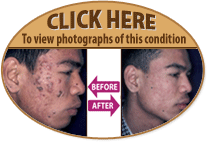 Acne can have various causes. Heredity, hormonal irregularities, stress, and pore-clogging cosmetics and hair products are the most common. If there is an underlying condition, such as poly-cystic ovary syndrome, it is important to get medical treatment to correct it.
Acne can have various causes. Heredity, hormonal irregularities, stress, and pore-clogging cosmetics and hair products are the most common. If there is an underlying condition, such as poly-cystic ovary syndrome, it is important to get medical treatment to correct it.
There are many presentations of acne. Papules, pustules, blackheads, whiteheads, nodules and cysts can be seen. Lesions are caused by blockage of the pores resulting in a build-up of oil and bacteria. The digestion of the oil by the bacteria results in inflammation. Picking and squeezing can further increase the inflammation.
 Dermatologists adjust their treatment of acne in darker skin individuals. Care must be taken to avoid unnecessary irritation that can increase post-inflammatory hyperpigmentation. Topical creams are used to improve the turnover of skin cells (exfoliate), and to decrease bacteria. Oral antibiotics are often beneficial. In severe or stubborn cases, oral retinoids can be used. Oral contraceptives and other male hormone blocking agents are sometimes useful. As with all medications, side effects are possible and your prescribing dermatologist will discuss the relative risks and benefits.
Dermatologists adjust their treatment of acne in darker skin individuals. Care must be taken to avoid unnecessary irritation that can increase post-inflammatory hyperpigmentation. Topical creams are used to improve the turnover of skin cells (exfoliate), and to decrease bacteria. Oral antibiotics are often beneficial. In severe or stubborn cases, oral retinoids can be used. Oral contraceptives and other male hormone blocking agents are sometimes useful. As with all medications, side effects are possible and your prescribing dermatologist will discuss the relative risks and benefits.
Post-inflammatory hyperpigmentation is very common among darker-skin ethnic groups. Burns, bites, and acne are typical causes. The inflammation causes a stimulation of pigment production. If the skin is injured into the deeper level, the pigment will appear darker and be even more resistant to treatment.
Post-inflammatory hyperpigmentation is a common, yet difficult problem to treat. Topical bleaching agents, retinoids and some topical anti-inflammatory agents are helpful. Light chemical peels and microdermabrasion have been found to be safe and effective. Risks and benefits of all procedures should be discussed with your dermatologist.
Always seek the advice of a board certified dermatologist for the best information on the care and treatment of your skin.
CLICK HERE to view photographs of this condition

